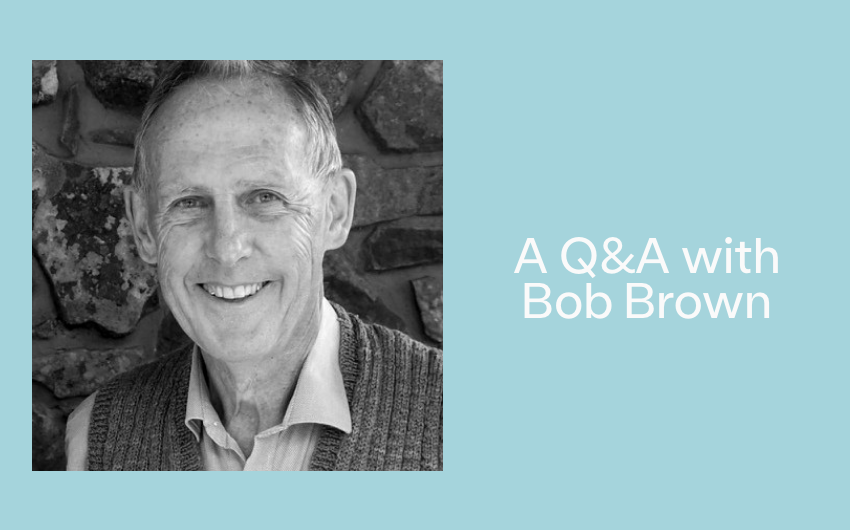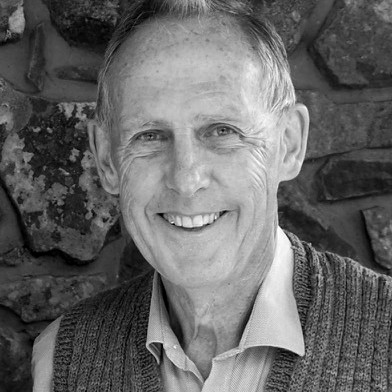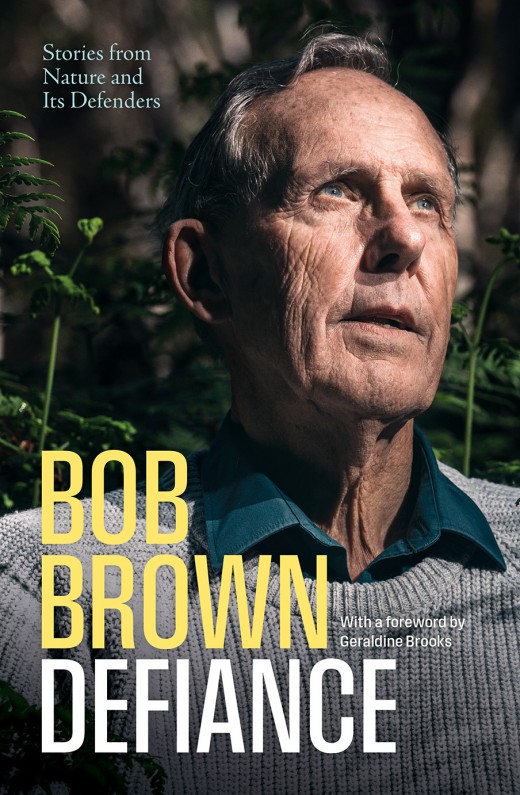News

News >
A Q&A with Bob Brown, author of Defiance
Bob Brown – erstwhile leader of the Australian Greens and environmental and social justice campaigner – chats with us about nature and activism, what he’s been up to since leaving the Australian senate, and his new book, Defiance: Stories from Nature and Its Defenders, which publishes on 30 September.
Could you tell us a bit about your forthcoming book, Defiance – what it’s about, why you decided to write it?
Defiance comprises 70 stories about defending nature and life on planet Earth as we know it. Getting the book together took time, as I was busier with my friends defending nature, not least the forests, ocean and wildlife of Tasmania. That business included being arrested three times. The book is my way of explaining why, with less of nature left than in all of human history, our leaders are destroying the little left faster than ever – and what we all should do about it.
This book, as mentioned, is called Defiance. Your previous book was called Optimism. Are defiance and optimism both key to your politics and activism? How do they reinforce, complicate or support each other?
Yes. I live by the trio qualities of optimism, defiance and compassion. I don’t have time left for a book on compassion but we all know what that means, perhaps best by the lack of it in Gaza and Ukraine. Defiance – standing up to the bullies destroying nature – depends on us retaining the optimism that we can win. You won’t win much with pessimism, and history – look at the suffragettes, emancipists and gay activists – is replete with hopeless human situations being changed. Yet it’s always necessary to keep our feet on the ground, to face reality.
One of the chapters in Defiance offers young people ‘twelve good reasons to enter politics’. What is your message to readers who might be feeling pessimistic or overwhelmed in the face of climate change and other challenges?
The prevailing theme in Defiance is ‘Don’t get depressed, get active!’. I spent a decade depressed as a youngster, and that’s tough: we are doing ourselves, as well as the planet, a favour by defying capitalism and the endless destruction it relies upon. From shopping at Vinnies (my personal couturier) to joining an in-forest blockade, there’s action aplenty without going beyond one’s own limits. Action is serious but it’s an essential gift to future generations, as well as our fellow creatures, on this little planet we all share.
Both your parents feature in Defiance, and it sounds like they were proud of your environmental advocacy. (There’s a lovely moment when your mother is asked, ‘You’re not a greenie, are you, Mrs Brown?’, and she replies, ‘Of course I am!’) Did nature and/or environmental issues feature in your childhood? What are your earliest memories of nature?
Trunkey is a tiny – one pub, one police station – village on the backroad from Bathurst to Orange, and we roamed free in the bush there. That bush was full of wonders. My mother was for looking after nature and my father was a living example of standing up to bigwigs and bullies, so I was doubly lucky. Nature or nurture? I don’t know – but I got a good mix of both and it never left me.
On that note: What led you to environmental activism, and how did you first get involved?
In Chicago in 1974, I joined a small protest against the slaughter of students, backed by Kissinger, in Athens. The ice was broken. Two years later I protested against nuclear weapons in Hobart and rafted down the wild Franklin River, which was then threatened by damming. I was jailed alongside hundreds of others during our peaceful blockade of the dam works in 1982, but the river was saved. And so it may be for the whole world this century if enough – i.e., 3.5 per cent of – people get going.
Defiance includes some captivating nature writing, reflecting on places as diverse as Greenland, Itirkawara (Chambers Pillar) in the Northern Territory and your home in Tasmania’s Liffey Valley. Do you have any favourite nature writers?
Judith Wright inspired me (‘Bob, what’s happened to conservationists? Where’s the fire in their belly?’) and Queenslander Stan Breeden’s A Feeling For Nature is a classic. So is deep green philosopher Val Plumwood’s The Eye of the Crocodile (the crocodile nearly ate her). Geoff Law’s The River Runs Free: Exploring and Defending Tasmania’s Wilderness is riveting. May Gibbs put the ‘wow!’ into gum nuts for children, including me, and for a videographer alone in the wilds I recommend Joe Shemesh’s Chasing Light: ‘Guided by starlight, I slowly waded into the onyx lake ...’
Since leaving the Australian Senate in 2012, you’ve set up the Bob Brown Foundation and been involved in a range of environmental campaigns, including direct action. For readers keen to get more active but unsure where to start, what do you recommend as a first step?
Join our foundation and come to one of its many easy classes on direct action – no commitment is required. But first, visit a threatened forest, woodland, beach or plain, like the Nullarbor in WA, and spend a night out there under the stars. Take forest- or river-defenders a cake or tub of soup. Or simply ask your local politician why they won’t save nature. And make sure to take the kids bush or the beach each Sunday: don’t let them miss the bus of experiencing nature for themselves.
This year we’ve seen elections both federally and in your home state of Tasmania. What issues do you hope to see prioritised during the next electoral cycle?
If only the 80 percent of Australians who want forest wildlife saved voted to save forest wildlife. Or the critically-endangered Maugean skate and red handfish. Coal mining and gas fracking is Labor-Coalition backed criminality. Simply vote for our children’s lives and happiness ahead of that criminality and the personal inducements the old parties use to divert people from global collapse this century. And how about an environmentalist becoming minister for the environment?
Is there one book – of any genre and on any subject – that you think everyone should read?
Yes, as Barcelona’s Antoni Gaudi recommended: ‘Everything comes from the great book of nature’.
Share this post
About the author
Bob Brown is an environmental and social justice campaigner and former senator. A founding member of the Wilderness Society, from 1978 he led the successful campaign against the construction of the Franklin Dam. He served in Tasmanian state parliament for a decade, was leader of the Australian Greens, and in 1996 was elected to the federal Senate. His books include Memo for a Saner World and Optimism. After retiring from the Senate in 2012, he established the Bob Brown Foundation, …
More about Bob Brown




